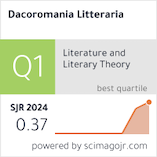ASCETICISM AGAINST COMMUNISM: USING LIFE DISCIPLINE IN THE COMMUNIST CONTEXT
(Abstract)
In her seminal work devoted to totalitarianism, Hannah Arendt notices that “normalizing” ways of life was not possible in either the Fascist or the Communist states. Through their nature, the totalitarian states eschew the stabilization of collective forms of life as well as the constitution of ethnic mannerisms, that is, a series of features that could define a community’s life. What needs to be emphasized here is the fact that, in the same sphere of the social domains affected by the totalitarian regime, Arendt also includes the legal regulations and the juridical system that are meant to ensure the social order. The same mechanism that destabilizes simple ways of life also affects – in the totalitarian context – the Law. Departing from the case of Nicolae Steinhardt (1912- 1989), who is a Romanian author with a bi-focal education (as a jurist and as a literary man), the present paper analyzes the link between the society’s constitutional ground and the forms of life unfolded during the Communist regime. Reading his texts on both constitutional and literary matters, before and after the establishment of the totalitarian regime in Romania, one can notice a high correlation between juridical thought and conceptualizations of ordinary life. Especially during the Communist regime when Law is seriously endangered, this correlation can be testified in Steinhardt’s great effort to transfer a principle of responsibility from the realm of Law (grounding the Constitution) to the realm of forms of life (as discipline).
Keywords: Nicolae Steinhardt, Totalitarian Regime in Romania, Way of Life, Rule of Life, Constitutional Law.


